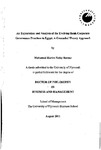An Exploration and Analysis of the Evolving Bank Corporate Governance Practices in Egypt: A Grounded Theory Approach
| dc.contributor.supervisor | Howell, Kerry E. | |
| dc.contributor.author | Sorour, Mohamed Karim | |
| dc.contributor.other | Plymouth Business School | en_US |
| dc.date.accessioned | 2011-08-23T15:18:15Z | |
| dc.date.available | 2011-08-23T15:18:15Z | |
| dc.date.issued | 2011 | |
| dc.identifier | 10042664 | en_US |
| dc.identifier.uri | http://hdl.handle.net/10026.1/546 | |
| dc.description.abstract |
This thesis investigates the phenomenon of corporate governance in the Egyptian banking sector (EBS); it aims to understand the nature of corporate governance in this context and identify the factors shaping it. Especially that these aspects had been ignored by the literature. Through grounded theory methodology, an empirical study of the nature of corporate governance in the EBS is undertaken, it identifies the factors affecting corporate governance in the EBS, the interests corporate governance is serving and as such outline the model of corporate governance prevailing in the EBS. Grounded theory methodology is illustrated by the thesis in the following ways. First, through an application of the comparative method in the open coding stage based on semi-structured interviews conducted with bank directors and executives, government officials, auditors and central bank officials, open coding developed categories and identified their properties and dimensions. Indeed, the interviews were informed by the survey of banks’ corporate governance (BCG) practices. Second, through axial coding open categories were subsumed into broader categories, and the relationships among these categories were established by means of the paradigm model. This has led to building the Bank Action Choice Matrix and the Paradigm Model of Evolving BCG in the EBS. Axial coding provided the basis of the substantive theory. Third, selective coding based on a second round of semi-structured interviews had identified the core category, verified its relationships with other sub-categories and eventually presented the substantive theory of BCG. The substantive theory was further explored in terms of the New Institutional Sociological Theory (NIST), leading to more formal substantive theory that consider corporate governance a social process affected by non-economic factors such as culture, politics, legal framework and human factors. It identified that BCG is in the process of institutionalization in the EBS. This process is geared toward the regulative pillar of institutions and the use of coercive power by the regulator, with banks adopting corporate governance seeking legitimacy. It also concluded that BCG is a political process, with powerful actors pushing to serve their interests; as such BCG is about power. Finally, it explained the heterogeneity of banks’ strategic responses to BCG institution, as some banks comply while others disguise their non-compliance, affected by internal organizational characteristics that hinder compliance and make some banks more susceptible to external obstacles. This thesis extended the use of grounded theory to explore the phenomenon of corporate governance in an unexplored context, identified the prevailing BCG model in the EBS and explained the substantive theory of BCG in terms of NIST as such offered a non-traditional perspective for corporate governance theorizing. It contributes to better understanding of NIST by accounting for institutionalization as a process and explaining the heterogeneity of organizational strategic responses. Finally, this thesis is the first attempt to combine corporate governance, grounded theory and NIST offering policy-makers useful views for BCG reform. | en_US |
| dc.language.iso | en | en_US |
| dc.publisher | University of Plymouth | en_US |
| dc.subject | Corporate Governance | en_US |
| dc.subject | Commercial Banks | |
| dc.subject | Grounded Theory | |
| dc.subject | Institutionalism | |
| dc.subject | Developing Countries | |
| dc.subject | Egypt | |
| dc.title | An Exploration and Analysis of the Evolving Bank Corporate Governance Practices in Egypt: A Grounded Theory Approach | en_US |
| dc.type | Thesis | |
| dc.identifier.doi | http://dx.doi.org/10.24382/3741 | |
| dc.identifier.doi | http://dx.doi.org/10.24382/3741 |
Files in this item
This item appears in the following Collection(s)
-
01 Research Theses Main Collection
Research Theses Main


